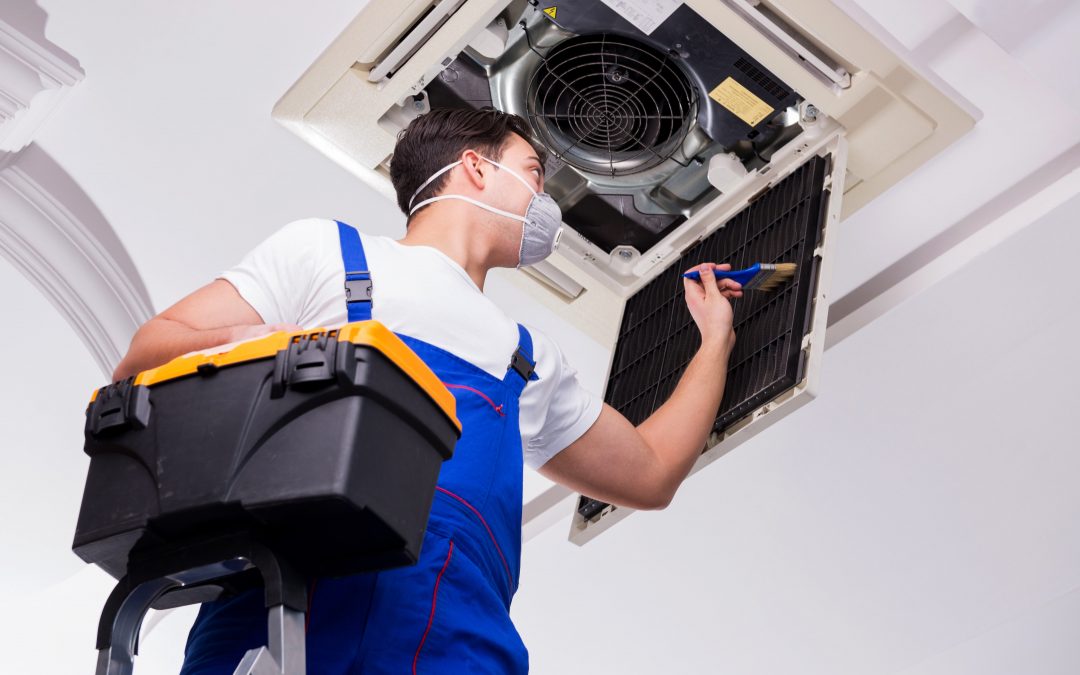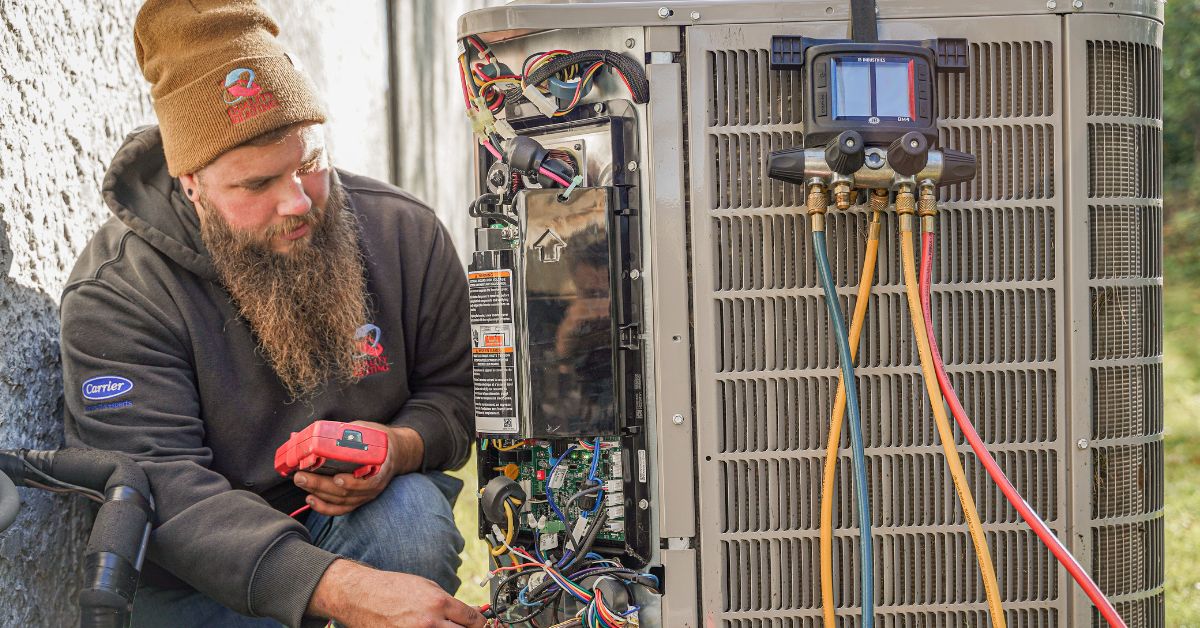Recognizing A/c: Typical Troubles of AC Units and Their Solutions
Cooling and heating systems play an important function in keeping interior convenience. Nevertheless, a/c devices frequently come across common issues that can impede their performance. Issues like insufficient cooling, uncommon noises, and frequent cycling can suggest deeper mechanical worries. In addition, water leakages and undesirable smells can compromise air top quality. Comprehending these obstacles and their options is important for efficient maintenance. What actions can homeowners take to guarantee their air conditioning units run successfully?
Inadequate Air Conditioning Efficiency
What causes inadequate cooling efficiency in a HVAC system? Numerous elements can add to this issue. An usual cause is an unclean air filter, which restricts air movement and minimizes cooling down performance. Additionally, reduced cooling agent levels due to leakages can prevent the system's capability to soak up warmth effectively. Another possible problem might develop from a malfunctioning thermostat, bring about inaccurate temperature readings and inappropriate cooling cycles. Blocked or unclean condenser coils can also avoid warmth dissipation, further influencing efficiency. Ductwork concerns, such as leakages or blockages, can result in uneven cooling throughout an area. Determining these troubles without delay is important for preserving optimal cooling and heating function and guaranteeing a comfy interior atmosphere. Regular maintenance and examinations can help reduce these issues and improve the system's overall effectiveness.
Uncommon Sounds Originating From the AC System
A range of uncommon noises coming from an air conditioner system can indicate underlying issues that require interest. Usual sounds include rattling, which might recommend loosened elements or particles within the unit. Hissing noises typically aim to refrigerant leakages, compromising the system's efficiency. A grinding noise might suggest worn-out bearings or motor concerns, while a high-pitched squeal may indicate a problem with the compressor or a sliding belt.
Each of these noises offers as a caution indication that something may be wrong, potentially leading to even more substantial damages otherwise dealt with quickly. House owners should prevent disregarding these acoustic cues and think about speaking with a qualified a/c specialist for diagnosis and repair work. Timely treatment can not only bring back capability however also expand the lifespan of the unit. ac fix. Acknowledging these noises as indicators of trouble is essential for keeping peak a/c efficiency
Regular Cycling On and Off
Constant cycling on and off can suggest inefficiencies or malfunctions within a HVAC system, frequently described as short-cycling. This condition can cause increased energy consumption and might trigger unnecessary endure the unit's components. A number of factors can add to this issue, including a poorly sized air conditioning unit, a malfunctioning thermostat, or filthy air filters. When an air conditioner device is also large for the room, it cools too quickly, creating it to cycle frequently without properly evaporating the air. If the thermostat is malfunctioning, it might incorrectly signify the unit to switch on and off. In addition, blocked or unclean air filters can limit air flow, motivating the system to function more challenging and cycle regularly. Resolving these issues immediately is important to improve performance, prolong the life expectancy of the heating and cooling system, and maintain perfect interior convenience.
Water Leaks and Drain Issues
Water leakages and water drainage issues can pose significant challenges for cooling and heating systems, resulting in potential damages and ineffectiveness. These issues usually originate from stopped up condensate drains, which prevent water from draining properly and can cause overflow. Furthermore, damaged drainpipe pans or improper setup may aggravate these leakages, causing water to collect in unwanted areas.
Regular upkeep is important to stop such problems; guaranteeing that condensate lines are clear and drainpipe pans are undamaged can reduce the threat of leaks. Homeowners need to regularly look for indicators of dampness around the device, as early detection can prevent a lot more comprehensive damages. In cases where leakages are identified, immediate action is called for, which might include getting rid of blockages or changing damaged parts. Addressing water leaks and water drainage issues not just secures the heating and cooling system yet also preserves indoor air high quality and comfort.
Bad Smells and Air Quality Concerns
Bad odors rising from HVAC systems can indicate severe air quality worries. Common sources of these unpleasant scents consist of mold, mildew, or germs growth in the ductwork, typically as a result of moisture accumulation. If the system has an undesirable, musty smell, it might indicate that the air filters are blocked or that there is insufficient air flow, enabling contaminants to circulate. Additionally, a burning smell could recommend electrical problems or overheating elements, needing immediate interest.
Homeowners must frequently replace air filters and schedule regular upkeep to assure peak air quality. Using an air cleanser can also assist get rid of odors and improve interior air top quality. If smells continue despite these measures, specialist evaluation and cleaning may be necessary to determine and their website settle underlying issues. HVAC company. Recognition licensed hvac contractors of these smells is vital, as they can influence health and convenience in interior atmospheres

Frequently Asked Concerns
Just how Usually Should I Arrange Air Conditioning Upkeep?
It is recommended to arrange a/c upkeep a minimum of yearly, ideally prior to the cooling period begins. Normal assessments can aid recognize problems early, making certain reliable operation and extending the life-span of the unit.

What Is the Average Life-span of an AC Device?
The average lifespan of an air conditioning system commonly ranges from 15 to 20 years. Factors such as maintenance, usage patterns, and ecological problems can considerably affect this period, impacting total performance and performance in time.
How Do I Choose the Right Size Air Conditioning System for My Home?

What Are the Indicators My AC Device Needs Replacement?

Can I Mount an A/c Unit Myself?
While installing an air conditioner system oneself is possible, it requires technical understanding and appropriate tools. HVAC contractor. Many people may face obstacles with installation, possibly causing ineffectiveness or safety dangers, making professional help advisable for suitable results
Final thought
In summary, recognizing common cooling and heating problems and their options is crucial for preserving effective air conditioning unit performance. Attending to concerns such as inadequate cooling, unusual sounds, constant cycling, water leakages, and unpleasant anonymous odors can substantially boost indoor comfort and air high quality. Normal upkeep, consisting of filter changes and timely repair work, plays a considerable duty in stopping these troubles. By staying proactive, homeowners can ensure their heating and cooling systems operate successfully, eventually prolonging the life expectancy of their cooling systems.